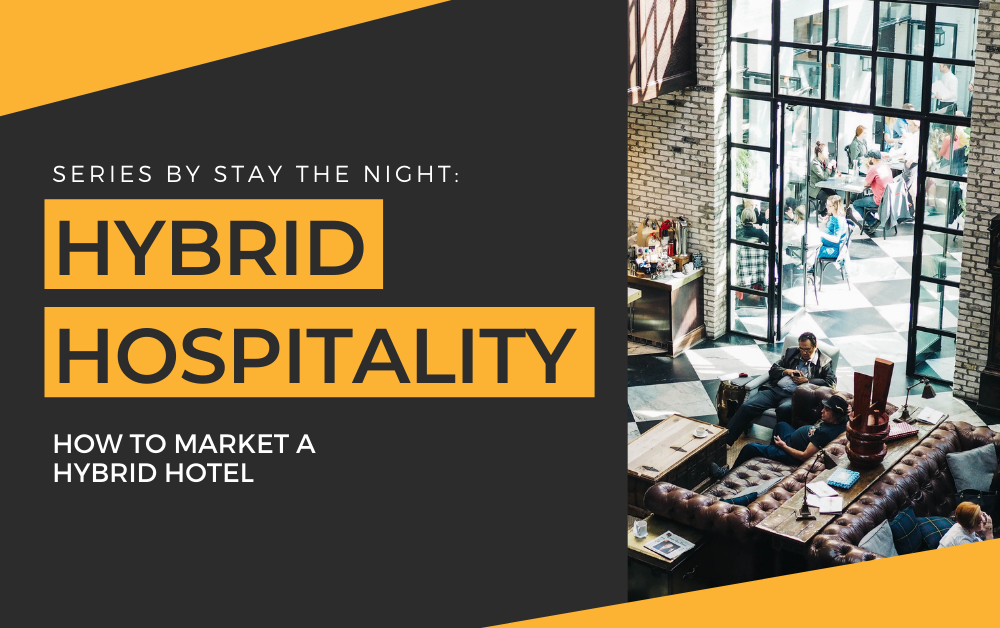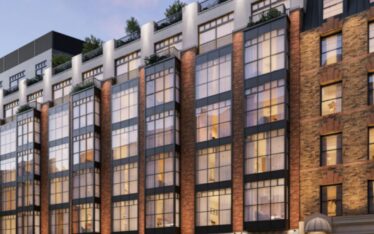While people have long used hotel bars and lobbies for socialising and working, the new wave of hybrid hotels blend coliving, coworking and shared social spaces.
Hybrids are dynamic, multifunctional spaces where people can stay, work, eat, drink and socialise, all under one roof.
With a number of different elements encompassed under one brand, marketing a hybrid is a different ball game to marketing a traditional hotel because you are appealing to several guest segments each with their own motivations and interests.
Below, we have listed our tips on how to market a hybrid hotel…
GET CLEAR ON YOUR STORY
When it comes to deciding where to stay, people are taking a business’s values into consideration more than ever before – so it is important to get really clear on your brand story.
In order to cultivate a personal connection with your audience, your story and what you stand for should run through everything that you do. Your brand story is what makes your hybrid unique so don’t allow it to be buried on a random page on your site that no one visits. People want to see what it is that you value, what you believe in and who you are – the stronger and more authentic your brand story is, the more likely it is for people to connect with you and build brand loyalty.
We recommend having a clear, unified brand narrative that tells your story and treating each element of your brand as a different chapter. The aim is to make your target audiences want to become part of this story. While your strategy should consider the typical demographics – age, location, etc. – it’s also important to go beyond this and really take the time to understand the mindset of your target audiences.
A great brand story gives people a valid reason to consider you above your competitors and has the power to turn your target audience into guests and then into brand ambassadors.
NAIL YOUR BRAND TONE OF VOICE
As the hybrid concept grows in popularity, you need to ensure that you stand out from your competitors – nailing your brand tone of voice is a powerful way to do this.
Once you have created your brand story, craft a personality and tone of voice to match. Dry sales copy with a couple of emojis thrown in will not interest or engage your target markets and will lead to very few conversions. They want to see a distinct, relatable tone of voice that actually shows there is a human behind the screen.
The right tone of voice allows your potential guests to build a rapport with your brand – if your audience feel aligned with your brand, they will want to visit you. Using popular pop culture phrases or injecting humour into your marketing could strike a chord with your audience and encourage them to share your content with their friends. This will lead to influencing their purchase decisions.
BUILD YOUR COMMUNITY
People are seeking connection and community – and your hybrid hotel is the ideal space to create that. Bringing people together – both online and offline – is what hybrid hospitality is all about.
You are creating a space where people can connect, collaborate and feel at home, together – but how do you build it in the first place?
Offering a program of activities as part of the overall guest experience will go a long way in building a community that people remember and return to. From morning yoga sessions and monthly business brunches to cocktail masterclasses and weekly wine hours, your programming is what will bring like-minded people together and create a community atmosphere. It also allows your brand to connect on a deeper level with the neighbourhood you are in by collaborating with local partners, freelancers and businesses.
When you have started creating a community offline, you are going to want to continue building a community around your brand online and show your online audience the experiences on offer at your hotel. The key is to focus on how you want people to feel in your space – it’s all about communicating the experiences you create onsite.
Capture snapshots of a popular event or a busy day of people working from your space and share on your social media channels to show the culture you have created. You should also encourage your guests to share posts on social media (and tag you) – social proof in the form of user-generated content is an incredibly powerful tool to build trust with your audience. When they see others being part of the community you have built, they will also want to be a part of it.
PERSONALISE YOUR COMMUNICATIONS
Personalising your communications goes beyond addressing your guests by name. It is a powerful tool to develop consumer loyalty and increase revenue, with 86% of consumers stating they are more likely to purchase from a brand who provides personalised experiences online.
It’s also a great way of getting an advantage over your competitors as despite the travel and hospitality industry shifting increasingly towards personalisation, less than 50% of consumers think travel brands know them or send them relevant communications that they would engage with.
Yet it’s vital that your brand gets this right. Personalising your communications has been proven to improve brand perception and guest experience, grow user engagement, boost bookings and increase marketing spend efficiency by 10–30%. Brand loyalty among millennials increases by 28% on average if they receive personalized marketing communications too.
So, how do you do it? Well, when guests book directly, it gives you the perfect opportunity to personalise their experience via email. Based on the information you have from their booking, send personalised pre-stay emails with additional experiences or amenities you offer that you think they would enjoy during their time with you.
By providing relevant and valuable information, you are building the foundations of a loyal relationship with your guests as well as increasing revenue from upselling. You can easily automate this process through your PMS or email service provider.
You can also personalise your marketing via your website. You can do this by automating pop-ups or banners promoting relevant promotions or packages to appear based on user behaviour, such as the pages they have previously visited.
Creating bespoke landing pages is also a great way to personalise your marketing and improve your conversion rate. Landing pages can be used across your marketing and in your paid ads. We recommend using landing pages in your retargeting ads as the user has already shown an interest in your brand. By personalising the ad with a relevant landing page, it increases the chance of making a final decision in the travel customer journey and confirm a booking.
SEGMENT YOUR EMAIL AUDIENCE
Email might be seen as old school by some but don’t overlook this tool. It’s a powerful and cost effective way to reach your audience in a place most people visit multiple times a day – their inbox.
A solid email marketing strategy is key to your success and should address each stage of the buyer journey. Generalised mass-email blasts are becoming increasingly less successful because – as we’ve explained above – people are now expecting a personalised email experience.
To increase the return on your investment when it comes to your brand’s email marketing, it’s time to start sending relevant emails to different segments of your audiences so they can actually connect with your message. This works because it shows you are communicating with your audience as individuals and are clearly tailoring your emails to what they’ve shown interest in.
So, how do you segment your email list? Well, there are a couple of ways which we’ll briefly explain. A simple way to segment your database is into potential guests, upcoming guests and past guests. Doing this ensures you are sending relevant information based on their interactions and experiences with you. For example, you could send an email to a past guest with a limited-time offer on accommodation or an experience they previously had with you to encourage a return visit. In contrast, a potential guest is still getting to know your brand so sending interesting and inspiring information on things they can get up to in your neighbourhood would be more suitable.
You can also segment your email list based on a person’s behaviour or location. While we have seen a dramatic rise in staycations this year due to COVID-19 (click here to download our Staycation Marketing Guide ebook), the general trend tends to be that it would be more likely for locals to use and engage with your spaces to work and socialise, rather than stay over. Segmenting your audience based on location means you would be able to send your local audience news, updates and offers on your bar, restaurant and upcoming events they could be interested in.
Using email automation with your segmentation strategy is a great way to send relevant and timely emails to prospective guests based on actions they have taken on your website. For example, if someone downloads your local guide to the neighbourhood from your site, you can create an email funnel which will send them related information. This provides you with the opportunity to deliver more value and build a relationship, which could eventually lead to them making the decision to spend money in your space.
Providing the right people with the right value at the right time will drive direct bookings and revenue for your hotel.
Interested in finding out more about how we can support you with this service for your brand? Drop us a message and let’s chat.
BE HUMAN ON SOCIAL MEDIA
Long gone are the days of your potential guests being satisfied with a cookie-cutter staged photo and a sales-focussed caption. People are craving authentic connections with brands and are seeking out businesses that appear human online.
A recent study found that 82% of people trust a brand more if it uses images of real customers in its advertising.
Your audience want to see people like themselves experiencing your spaces before they decide on whether to book a stay, visit your space to work or grab a drink at your bar.
In fact, over the past few months, research has shown that the more a brand shares emotional and ‘human’ interest posts, the more relatable they become to their followers and potential guests (and therefore the more likely they will want to venture out and support them!). ⠀⠀
Establishing and building a relationship with your online community has never been more vital – it’s time to go beyond the sales posts and connect with your potential guests.
CREATE SEPARATE AD FUNNELS FOR EACH TARGET MARKET
We run paid social ads for our clients and see very high return on investment. In fact, despite the impact the global COVID-19 pandemic has had, we have achieved fantastic results. In 2020 so far, for every £1 our clients put into their ads budget, they have received on average £19 back in increased revenue.
Using paid advertising on social media is a highly effective way of increasing brand awareness among your exact target audiences and boosting both bookings and revenue.
Your brand offers a range of different services and experiences therefore one universal ad strategy simply won’t work. In order to see a good rate of return on your investment, we recommend creating separate ad funnels for each target market when running brand awareness campaigns. This will ensure you are reaching the right kind of people with the right kind of ad which will increase conversions.
Each funnel should include multiple ad sets and ads – these will guide your potential guests through the booking journey. Ads can be tailored to who you are trying to reach by a number of factors including interests, behaviours, age and location.
You could also utilise the Lookalike Audiences function whereby you create a group with similar characteristics to one of your current audiences e.g your Instagram followers. Using this tactic means more work upfront and more ads management behind the scenes, but we promise the ROI is worth it.
To take advantage of Facebook’s powerful (re)targeting tools, ensure the Pixel is integrated with your website – this is something your web developer can set up for you (or drop us a message – we’re happy to help).
PROMOTE YOUR PROGRAMMING
We’ve mentioned above the importance of programming and we know that it is a key revenue stream for a hybrid hotel – but how do you effectively promote the unique experiences you are offering to your target markets?
In terms of actionable steps to take, ensure that your current audiences are aware of upcoming events by regularly promoting them on social media. This could include uploading a weekly itinerary to your Highlights on Instagram and creating events on your Facebook page.
To grow awareness among locals, search for – and share posts in – relevant Facebook groups which have members that you think would be interested in aspects of your programming. Just be aware of the group rules as some do not like blatant brand promotion. In addition to this, utilising event ticketing websites such as Eventbrite or MeetUp will also boost brand awareness and bookings among new audiences in your local area.
We also recommend creating a section on your website with all the relevant and up-to-date information for the programming you are running. To increase revenue and promote pre-booking offers, you should add an option to book via your site.
INVEST IN PR
Investing in PR is essential to boost awareness of your hotel, get the word out there about your brand and position you as a market leader.
To secure quality press coverage, it’s not simply about sending your property description out and expecting the features to roll in.
To catch the attention of journalists, you will need to think about your brand’s USPS and what makes it newsworthy – and then how you can creatively communicate this.
While we do recommend hiring an expert in this area (our team can help you!) , we understand you may want your team to give it a go yourself first. If so, as a first step we advise is thinking about who it is you want to reach and which publications they are likely to read. Take a look at the types of features those publications publish and see how your hotel’s angle could potentially fit.
Our top tip? Avoid sending a cookie cutter email to a huge list of journalists – taking the time to tailor your message to each person you contact will improve your success rate.
BALANCE YOUR CREATIVE
Effectively communicating what your hybrid brand offers can be challenging. In order to reach your target markets and represent the varying services and experiences you offer, it’s important to diversify your content and ensure it remains balanced.
An easy way to do this is to plan and schedule your social media, blog and email content in advance so you are able to review your posts and double-check what is being sent out across your platforms.
We would also recommend setting up a yearly marketing calendar so it is easier to plan – and successfully execute – themed campaigns which incorporate what you offer and strengthen your brand.
DON’T SLEEP ON THE POWER OF GOOGLE ADS
We know that 90% of travellers do all their trip research online, but how do you get in front of them? Using Google Ads is one of the most powerful platforms to use to get you in front of people who are actively searching for what you offer, drive direct bookings and increase revenue.
Using this PPC channel means that you pay a fee to have your website displayed on the search engine results page (SERP) when someone types in specific keywords or phrases – for example, ‘hotel with coworking space in London’. By selecting the right keywords and phrases, you can position your website at the top of the search results. Taking the time to research the keywords your target market are searching for is key.
We also recommend setting up Google Hotel Ads for your brand. Differing slightly to the general Google Ads platform, Google Hotel Ads shows your hotel availability and rates to users who enter relevant search queries across Google Search (on the right hand side of the screen), Maps and the Assistant. One of the best features is that it displays real-time rates and availability for your property – this means on dates when you are fully booked, your ad will not show and you won’t be charged.
For each hotel ad displayed, Google Hotel Ads allows users to perform easy room rate comparisons and offers links to different booking platforms, enabling potential guests to find the best price (and your brand to compete with OTAs in Google search results) .
We can’t cover everything you need for Google Ads within this post, but you can check out our post on this topic which has everything you need to know about using this platform to grow your revenue.
CREATE A LOYALTY SCHEME FOR YOUR F&B OFFERING
Competing with nearby cafes, bars, coworking sites and hotels can be challenging when it comes to promoting your spaces as multi-use for people to work and socialise.
Setting up a loyalty scheme for your food and beverage offering is a great way to build a relationship with your customer base, grow a community of repeat guests and increase your revenue. The perk of being rewarded for loyalty with a free coffee or beer will go a long way in making your guests feel valued. In turn, this will increase the likelihood of them becoming a regular in your space as well as recommending to their peers.
DIG INTO YOUR DATA
If you are familiar with us and our blog content, you will know the emphasis we place on data.
Everything we do for our clients is data-driven.
That’s because it’s the only sure way to know how well your marketing is performing. It also allows you to gain valuable insight into your audiences that helps to inform your strategy.
On a monthly basis (at least), make sure you take the time to review where your web traffic is coming from, which content is driving the most traffic to your site and where your enquiries and bookings are coming from. When it comes to social media analytics, assess your most popular – and least popular – posts to develop an understanding of what resonates with your audience. This valuable information can then inform your marketing tactics going forward, ensuring that you replicate your successes and avoid any potential pitfalls.
In addition to this, it’s important to be tracking your paid social ads via Ads Manager – a number of our clients struggled to see ROI on the ads they were running prior to working with us and it continues to be a common theme among businesses we speak with.
Using Ads Manager, we recommend checking insights such as reach, unique link clicks and website purchases on a frequent basis to ensure you are getting the most bang for your buck. The same goes for Google Ads where you need to be keeping an eye on insights such as average CPC, CTR and conversions.
If you are working with influencers, be sure to request a data snapshot of the results they have achieved for your brand as part of your collaboration. You can also check on the level of influence they have had via aspects of your Google Analytics such as your traffic sources.
There is so much data at your fingertips to help you inform your marketing strategies on how to market your hybrid hotel – it’s fundamental to your success that you utilise it.
We hope you found these tips on how to market a hybrid hotel useful – if you are looking for support for your brand, drop us a message and a member of our expert team will be in touch.
Don’t forget to catch up on our previous Hybrid Hospitality blog posts including how to market your coliving or coworking space.

DOWNLOAD OUR WHITE PAPER – THE FUTURE OF HOSPITALITY: WHY 2021 IS THE YEAR OF THE HYBRID
Looking forward to 2021, the lines between where we live, work, and play are blurring faster than ever before. As people demand more from the hospitality experience, hybrids are in a strong position to meet this new consumer where they are. In this white paper, we share our 6 predictions on why 2021 will be the year of the hybrid. We also have interviews with leaders in this space who share their insights on the future of the industry.



